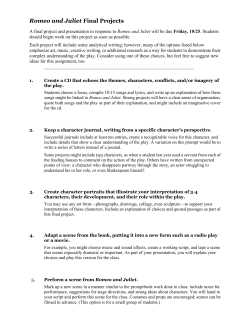
Mississippi Burning Opening Sequence
Mississippi Burning Opening Sequence WATER FOUNTAIN SCENE People • Two anonymous figures – Highlights that racial tension affects whole community • White person first – Whites are superior to blacks • Black child – Child, indicates Parker’s sympathy is with black community – Could also mean blacks treated like children Fountains • White fountain hand operated/black constantly running – Whites have power to control events, black community are powerless • ‘White’ sign higher than ‘colored’ – Superior attitude. Although separate, not equal • White fountain new, metallic, good working order/ black one old, state of disrepair, low pressure – Discrimination in all aspects of life • Pipe divides the fountains and screen – shows the racial divide and the central concern of film Lighting and Music • Light comes in from white side – Dark shadows cast over black side symbolising the persecution by the whites • Whole scene fairly dark – Majority of whites also in the dark regarding their racist views • Traditional gospel music – Plea to God from the oppressed/persecuted people – Soulful but depressing. Engages viewer’s emotions. The Title Monochrome Title Visual Metaphor representing racial divide • Black background – Black community pushed into the background • Title in white – Whites remain prominent. Their views heard over blacks’. Burning Community Burning Church • Supposed to provide peace and comfort, symbol of love and hope – Destroyed by hatred of white community – Symbolises loss of peace and hope in community • Visual representation of hate and destruction – Racial tensions in community • Gradually collapses – Community gradually collapsing/torn apart by racism of whites Contrast with Water Fountain Scene • Running water creates sense of calm – Represents life/life giving element – Peaceful • Contrast with destructive force of fire – Racial divide is destructive • Juxtaposition of two images – Very different but both symbolise division in community Chase Sequence Sound • Silence at start – Illustrates isolation of setting • Music commences – Peace will soon be disturbed • Sound of snare drum – When ‘authorities’ enter scene – Like a march, two communities going to war – Like the drum roll heard before an execution • Boys’ car enters scene – Sound of crickets, peaceful • Police cars enter scene – Revving engines, menacing. Intend to intimidate Music builds tension, especially as it speeds up Lighting • Black boy in back in darkness – Shadow hangs over him, perhaps marking him out – Could be ominous foreshadowing of imminent fate – Reminds us of opening shot of water fountain • KKK members step out of car – Unable to see clearly because of strong light – Highlights secrecy of activities/hidden identity • Shine torches in faces of activists – Intimidates but also unable to clearly see their faces – Illustrates mystery with which they keep their racist activity surrounded • Screen goes black after first gunshot – Only one possible conclusion – do not need to see to know what happens • Happens at night – Under the cover of darkness Camera Shots • Long shot – Car’s progress: single car in undulating road. Ominous. – Alternates with close-ups in car • Wide angle shots of convoy – Shows no escape – Reinforces vulnerability of boys: single car in vast countryside – See ‘predator’ • Close-up of black boy – Unsettled, uneasy. Allows viewer to empathise – Looks over shoulder – black community always doing so in fear • Long shots to close-ups – Predatory cars chasing their victim – Become part of the panic inside the car • Keep changing Camera Angles – Echoes unsettled, frightening, chaotic nature of scene • Point of view angle – Feels like we are partaking in action • Extreme close-ups – Viewer empathises with activists – Can see fear • High angle shots – Establish dominance of the police and vulnerability of victims • Framing of head and chin of one of the murderers – Terrifying in its effect • Close up of gun and trigger being pulled – Shocking shot – shocks us out of apathy – Close up of blood on face is harrowing Dialogue • Black activist assesses the situation correctly – ‘Oh, they ain’t playin’, you better believe it.’ • Klansman – ‘I shot me a nigger’: feeds into existing knowledge of the Klan – Deep southern drawl • Language makes viewer uneasy – ‘Jew boy’ and ‘Nigger lover’
© Copyright 2025





















